

Commentary Select
Commentary Select




Tyndale New Testament Commentaries: Ephesians (Foulkes 1989) - TNTC

Tyndale New Testament Commentaries: Ephesians (Foulkes 1989) - TNTC
Unlike Paul's letters to the Galatians or the Corinthians, the letter to the Ephesians contains almost no clues about the situation and issues its recipients faced. Nevertheless, the letter vividly depicts how God's will revealed in Christ reorients believers' lives toward unity, mutual respect, submission and love--in short, new life in Christ. Francis Foulkes expounds with clarity and ease the letter's central themes and emphases.
The Tyndale New Testament Commentaries have long been a trusted resource for Bible study. Written by some of the world's most distinguished evangelical scholars, these twenty volumes offer clear, reliable, and relevant explanations of every book in the New Testament.
These Tyndale volumes are designed to help readers understand what the Bible actually says and what it means. The introduction to each volume gives a concise but thorough description of the authorship, date, and historical background of the biblical book under consideration. The commentary itself examines the text section by section, drawing out its main themes. It also comments on individual verses and deals with problems of interpretation. The aim throughout is to get at the true meaning of the Bible and to make its message plain to readers today.
Reviews
"The Tyndale volumes have long been the premier shorter-length commentary series on both Testaments throughout the English-speaking world." — Craig Blomberg, Denver Seminary"Tyndale commentaries are always useful, not least because they focus so clearly on the text of Scripture, and do not fall into the trap of paying too much attention to other commentaries and not enough to the scriptural text they are intended to expound and explain. So they retain their usefulness for preachers, Bible study leaders and for all readers of the Bible." — Peter Adam, principal, Ridley College, Melbourne, Australia
"Within its constraints, this series includes some outstanding volumes." — D. A. Carson, Trinity Evangelical Divinity School
"The evenness and quality of this series are remarkable." — Christianity Today
"There simply is no series of medium-length commentaries that approaches the excellence of the Tyndale commentaries." — Donald A. Hagner, Fuller Theological Seminary
Francis Foulkes (1926-1997) was warden of St. John's College at the University of Auckland, New Zealand. His books include A Guide to St. Matthew's Gospel and Ephesians in The Tyndale New Testament Commentary series
Tyndale New Testament Commentaries: Galatians (Cole) - TNTC
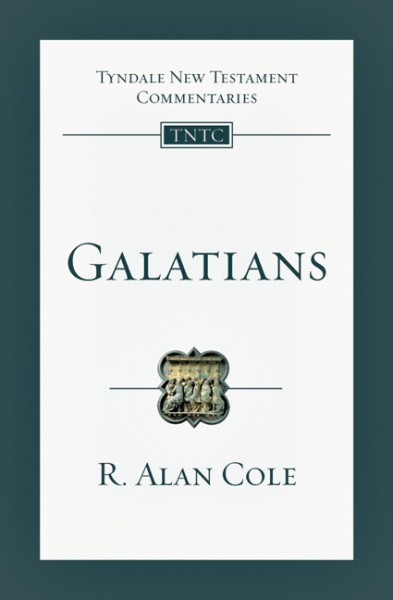
Tyndale New Testament Commentaries: Galatians (Cole) - TNTC
In Galatians, the apostle Paul makes his most passionate and direct appeal for a gospel free of ethnic or ritual exclusion. Paul's gospel is that of salvation through Christ alone--in him there is "neither Jew nor Greek, slave nor free, male nor female, for you are all one in Christ Jesus." By placing Paul's discussion firmly within its historical context, R. Alan Cole illuminates the potency and power of Paul’s message to the Galatian church.
The Tyndale New Testament Commentaries have long been a trusted resource for Bible study. Written by some of the world's most distinguished evangelical scholars, these twenty volumes offer clear, reliable, and relevant explanations of every book in the New Testament.
These Tyndale volumes are designed to help readers understand what the Bible actually says and what it means. The introduction to each volume gives a concise but thorough description of the authorship, date, and historical background of the biblical book under consideration. The commentary itself examines the text section by section, drawing out its main themes. It also comments on individual verses and deals with problems of interpretation. The aim throughout is to get at the true meaning of the Bible and to make its message plain to readers today.
Reviews
"The Tyndale volumes have long been the premier shorter-length commentary series on both Testaments throughout the English-speaking world." — Craig Blomberg, Denver Seminary"Tyndale commentaries are always useful, not least because they focus so clearly on the text of Scripture, and do not fall into the trap of paying too much attention to other commentaries and not enough to the scriptural text they are intended to expound and explain. So they retain their usefulness for preachers, Bible study leaders and for all readers of the Bible." — Peter Adam, principal, Ridley College, Melbourne, Australia
"Within its constraints, this series includes some outstanding volumes." — D. A. Carson, Trinity Evangelical Divinity School
"The evenness and quality of this series are remarkable." — Christianity Today
"There simply is no series of medium-length commentaries that approaches the excellence of the Tyndale commentaries." — Donald A. Hagner, Fuller Theological Seminary
The late R. Alan Cole was lecturer in Old Testament at Moore Theological College, Sydney, and Trinity Theological College, Singapore. He wrote the Tyndale New Testament Commentary series volumes Mark and Galatians.
Tyndale New Testament Commentaries: Hebrews (Guthrie) - TNTC

Tyndale New Testament Commentaries: Hebrews (Guthrie) - TNTC
The book of Hebrews is quite challenging, claims commentary author Donald Guthrie, since there are many open questions about authorship, historical setting and audience. More than most New Testament books, Hebrews requires detailed explanations of the background allusions within it, which reference the priesthood of Christ being directly linked to the old Levitical order. Above all, Hebrews deals with the important question, How can we approach God?
The Tyndale New Testament Commentaries have long been a trusted resource for Bible study. Written by some of the world's most distinguished evangelical scholars, these twenty volumes offer clear, reliable, and relevant explanations of every book in the New Testament.
These Tyndale volumes are designed to help readers understand what the Bible actually says and what it means. The introduction to each volume gives a concise but thorough description of the authorship, date, and historical background of the biblical book under consideration. The commentary itself examines the text section by section, drawing out its main themes. It also comments on individual verses and deals with problems of interpretation. The aim throughout is to get at the true meaning of the Bible and to make its message plain to readers today.
Reviews
"The Tyndale volumes have long been the premier shorter-length commentary series on both Testaments throughout the English-speaking world." — Craig Blomberg, Denver Seminary"Tyndale commentaries are always useful, not least because they focus so clearly on the text of Scripture, and do not fall into the trap of paying too much attention to other commentaries and not enough to the scriptural text they are intended to expound and explain. So they retain their usefulness for preachers, Bible study leaders and for all readers of the Bible." — Peter Adam, principal, Ridley College, Melbourne, Australia
"Within its constraints, this series includes some outstanding volumes." — D. A. Carson, Trinity Evangelical Divinity School
"The evenness and quality of this series are remarkable." — Christianity Today
"There simply is no series of medium-length commentaries that approaches the excellence of the Tyndale commentaries." — Donald A. Hagner, Fuller Theological Seminary
Donald Guthrie (1915-1992) was a graduate of the University of London (B.D., Th.M., Ph.D.). From 1949 until his retirement in 1982 Guthrie was lecturer in New Testament studies at London Bible College, and from 1978 until 1982 he also served as vice principal of the college. His books include New Testament Introduction, New Testament Theology, and the Tyndale New Testament Commentaries on the Pastoral Epistles and Hebrews.
Tyndale New Testament Commentaries: Hebrews (Peterson 2020) - TNTC
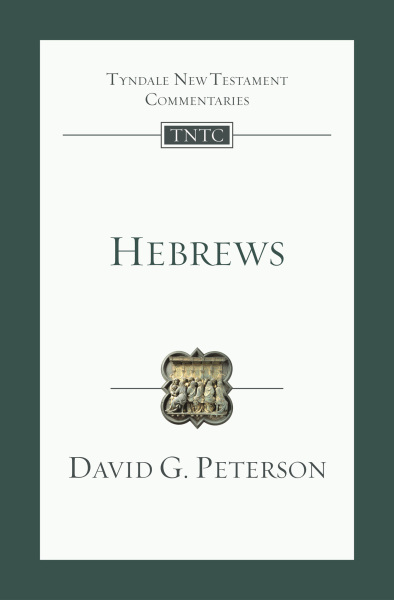
Tyndale New Testament Commentaries: Hebrews (Peterson 2020) - TNTC
The letter to the Hebrews presents a combination of warnings and assurances to encourage Christians to persevere in faith, hope and love. The basis for this is a profound reflection on the person and work of Christ, viewed as the fulfilment of Old Testament Scripture. David Peterson shows how the author expounds the implications of the gospel with pastoral insight and sensitivity, producing a ‘word of exhortation’ that reaches across the centuries to speak to our lives today.
The Tyndale Old Testament Commentaries have long been a trusted resource for Bible study. The introduction to each volume gives a concise but thorough description of the authorship, date and historical background of the biblical book under consideration. The commentary itself examines the text section by section, drawing out its main themes. It also comments on individual verses and deals with problems of interpretation. Written by some of the world's most distinguished evangelical scholars, they continue to aim at the true meaning of the Bible and to make its message plain to readers today.
David G. Peterson is an emeritus faculty member at Moore Theological College in Sydney, where he still teaches part-time. He served as principal of Oak Hill College, London, from 1996 to 2007. His books include The Acts of the Apostles from the Pillar New Testament Commentary, Romans from the Evangelical Biblical Theological Commentary, Engaging with God, Possessed by God, Transformed by God and Hebrews and Perfection.
Tyndale New Testament Commentaries: James, Revised Ed. (Moo 2015) — TNTC
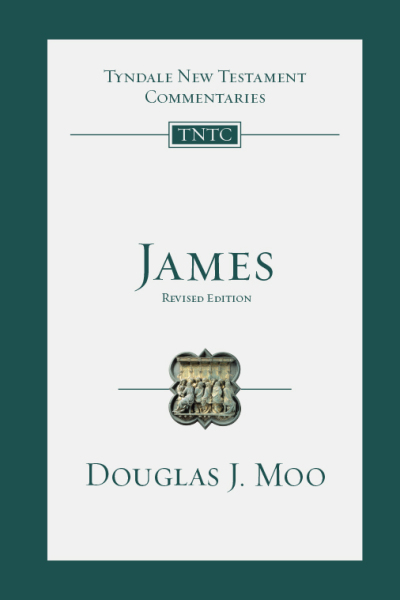
Tyndale New Testament Commentaries: James, Revised Ed. (Moo 2015) — TNTC
The genius of the letter of James lies in its powerfully simple call for repentance, for action, for a consistent Christian lifestyle. In his revised Tyndale New Testament Commentaries: James, Douglas Moo allows James's words to cut through our theological debates, our personal preconceptions, our spiritual malaise and return us to an invigorating, transforming Christianity. This second-edition volume in the storied Tyndale New Testament Commentary series includes a new extensive introduction, analysis and section-by-section commentary of the book of James.
"The Bible is being translated, commented on, read, studied, preached and analyzed as never before. But it is questionable whether it is being obeyed to a comparable degree," says Moo in the preface. "All this suggests that the message of James is one that we all need to hear—and obey."
The Tyndale New Testament Commentaries have long been a trusted resource for Bible study. Written by some of the world's most distinguished evangelical scholars, these twenty volumes offer clear, reliable, and relevant explanations of every book in the New Testament.
These Tyndale volumes are designed to help readers understand what the Bible actually says and what it means. The introduction to each volume gives a concise but thorough description of the authorship, date, and historical background of the biblical book under consideration. The commentary itself examines the text section by section, drawing out its main themes. It also comments on individual verses and deals with problems of interpretation. The aim throughout is to get at the true meaning of the Bible and to make its message plain to readers today.
Reviews
"The Tyndale volumes have long been the premier shorter-length commentary series on both Testaments throughout the English-speaking world." — Craig Blomberg, Denver Seminary"Tyndale commentaries are always useful, not least because they focus so clearly on the text of Scripture, and do not fall into the trap of paying too much attention to other commentaries and not enough to the scriptural text they are intended to expound and explain. So they retain their usefulness for preachers, Bible study leaders and for all readers of the Bible." — Peter Adam, principal, Ridley College, Melbourne, Australia
"Within its constraints, this series includes some outstanding volumes." — D. A. Carson, Trinity Evangelical Divinity School
"The evenness and quality of this series are remarkable." — Christianity Today
"There simply is no series of medium-length commentaries that approaches the excellence of the Tyndale commentaries." — Donald A. Hagner, Fuller Theological Seminary
Douglas J. Moo (PhD, University of St. Andrews) is the Kenneth T. Wessner Professor of New Testament at Wheaton College Graduate School. He has written numerous New Testament commentaries for the NIV Application Commentary series and the Tyndale New Testament Commentary series, specifically on the Pauline and general letters. Since 2006, he has chaired the Committee on Bible Translation, the group of scholars charged with revising the text of the NIV, and is the coauthor of The Rapture: Pre-, Mid-, or Post-Tribulational? and The Law, the Gospel, and the Modern Christian: Five Views.
Tyndale New Testament Commentaries: John, Revised Ed. (Kruse 2017) — TNTC
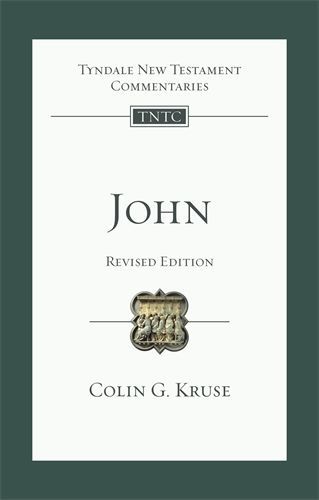
Tyndale New Testament Commentaries: John, Revised Ed. (Kruse 2017) — TNTC
Among the Gospels, John's is unique. It has a structure with long conversations and extended debates, and much of its content is not found elsewhere. Jesus' relationship to the Father and his teaching on the Holy Spirit are given special prominence. Ultimately, faith, believing in Jesus, is at the center—with signs highlighted to provoke faith, and stories of those who responded to Jesus as examples of faith. Colin Kruse in Tyndale New Testament Commentaries: John, Revised Ed. ably shows how the Fourth Gospel weaves its themes of belief and unbelief into its rich Christology.
The Tyndale New Testament Commentaries have long been a trusted resource for Bible study. Written by some of the world's most distinguished evangelical scholars, these twenty volumes offer clear, reliable, and relevant explanations of every book in the New Testament. The original, unrevised text of this volume has been completely retypeset and printed in a larger, more attractive format with the new cover design for the series.
These Tyndale volumes are designed to help readers understand what the Bible actually says and what it means. The introduction to each volume gives a concise but thorough description of the authorship, date, and historical background of the biblical book under consideration. The commentary itself examines the text section by section, drawing out its main themes. It also comments on individual verses and deals with problems of interpretation. The aim throughout is to get at the true meaning of the Bible and to make its message plain to readers today.
Reviews
"The Tyndale volumes have long been the premier shorter-length commentary series on both Testaments throughout the English-speaking world." — Craig Blomberg, Denver Seminary"Tyndale commentaries are always useful, not least because they focus so clearly on the text of Scripture, and do not fall into the trap of paying too much attention to other commentaries and not enough to the scriptural text they are intended to expound and explain. So they retain their usefulness for preachers, Bible study leaders and for all readers of the Bible." — Peter Adam, principal, Ridley College, Melbourne, Australia
"Within its constraints, this series includes some outstanding volumes." — D. A. Carson, Trinity Evangelical Divinity School
"The evenness and quality of this series are remarkable." — Christianity Today
"There simply is no series of medium-length commentaries that approaches the excellence of the Tyndale commentaries." — Donald A. Hagner, Fuller Theological Seminary
Colin G. Kruse (PhD, Fuller Theological Seminary) is senior lecturer of New Testament at Melbourne School of Theology. In the twenty years following his ordination into the Anglican ministry, Kruse gained practical experience in parishes in Australia and the U.S. along with five years of missionary service as a theological lecturer in Indonesia. Besides journal articles on the New Testament, Old Testament and the Dead Sea Scrolls, Kruse has authored several books including Paul, the Law and Justification and New Testament Models for Ministry: Jesus and Paul. He has also written the Tyndale New Testament Commentary on 2 Corinthians and the Pillar New Testament Commentary titles The Letters of John and Paul's Letter to the Romans.
Tyndale New Testament Commentaries: Luke (Morris) - TNTC
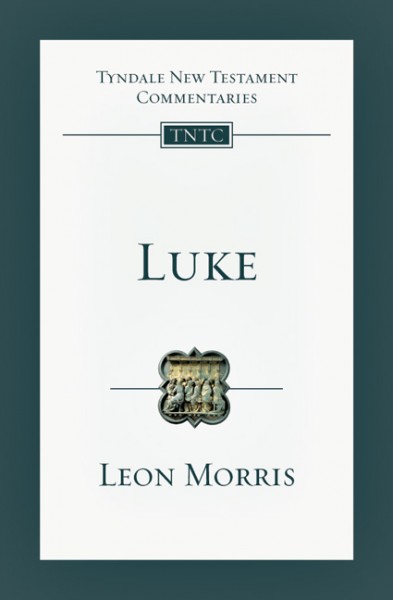
Tyndale New Testament Commentaries: Luke (Morris) - TNTC
The Gospel of Luke presents many unique pictures of Jesus. We see him in his Father's house as a child; deliberately associating with the poor and the disreputable; and in communion with the Holy Spirit. We also see the larger picture of Jesus setting out resolutely for Jerusalem in order to fulfill God's plan for the world. With awareness of scholarly discussions and attentiveness to both the text and the reader, Leon Morris places the themes of Luke's Gospel within the context of God's plan for all people.
The Tyndale volumes are designed to help readers understand what the Bible actually says and what it means. The introduction to each volume gives a concise but thorough description of the authorship, date, and historical background of the biblical book under consideration. The commentary itself examines the text section by section, drawing out its main themes. It also comments on individual verses and deals with problems of interpretation. The aim throughout is to get at the true meaning of the Bible and to make its message plain to readers today.
Reviews
"The Tyndale volumes have long been the premier shorter-length commentary series on both Testaments throughout the English-speaking world." — Craig Blomberg, Denver Seminary"Tyndale commentaries are always useful, not least because they focus so clearly on the text of Scripture, and do not fall into the trap of paying too much attention to other commentaries and not enough to the scriptural text they are intended to expound and explain. So they retain their usefulness for preachers, Bible study leaders and for all readers of the Bible." — Peter Adam, principal, Ridley College, Melbourne, Australia
"Within its constraints, this series includes some outstanding volumes." — D. A. Carson, Trinity Evangelical Divinity School
"The evenness and quality of this series are remarkable." — Christianity Today
"There simply is no series of medium-length commentaries that approaches the excellence of the Tyndale commentaries." — Donald A. Hagner, Fuller Theological Seminary
Leon Morris (1914-2006), one of the leading evangelical New Testament scholars of the twentieth century, served as principal of Ridley College in Melbourne, Australia. He was the author of more than forty works, including The Apostolic Preaching of the Cross, The Atonement, and comprehensive scholarly studies on Matthew, Luke, John, and Romans. He was the general editor of the Tyndale New Testament Commentaries and wrote the volumes in that series on Luke, 1 Corinthians, 1 & 2 Thessalonians, and Revelation.
Tyndale New Testament Commentaries: Luke (Perrin 2022) - TNTC

Tyndale New Testament Commentaries: Luke (Perrin 2022) - TNTC
In this insightful and accessible biblical commentary, Nicholas Perrin explores the many unique pictures of Jesus found in the Gospel of Luke – from being a child in his Father’s house to associating with the poor and disreputable, in communion with the Holy Spirit, and, above all, setting out resolutely for Jerusalem to fulfil God’s plan for the world.
With particular attention to the redemptive-historical storyline and its scriptural roots, Perrin examines how Luke’s Gospel is embedded in human history. He also show how it follows a cyclical narrative structure, with each recapitulation expanding the horizons of what has gone before.
Part of the Tyndale New Testament commentary series, Luke: An Introduction and Commentary examines the text section-by-section – exploring the context in which it was written, providing astute commentary on Luke’s Gospel, and then unpacking the theology. It will leave you with a thorough understanding of the content and structure Gospel of Luke, as well as what it means and its continued relevance for Christians today.
The Tyndale New Testament Commentaries are ideal Bible commentaries for students and teachers of theology, as well as being usable for preachers and individual Christians looking to delve deeper into the riches of Scripture and discover its meaning for today.
Perceptive, cogent and thorough, Nicholas Perrin’s commentary on Luke will give you a renewed appreciation for Luke’s Gospel and a greater understanding of why it is such a vital part of Scripture.
Nicholas Perrin is president of Trinity International University, Deerfield, Illinois. His previous books include Thomas: The Other Gospel, The Exodus Revealed, Jesus the Temple, Jesus the Priest, Lost in Transmission?, and The Kingdom of God.
Tyndale New Testament Commentaries: Mark (Schnabel 2017) — TNTC
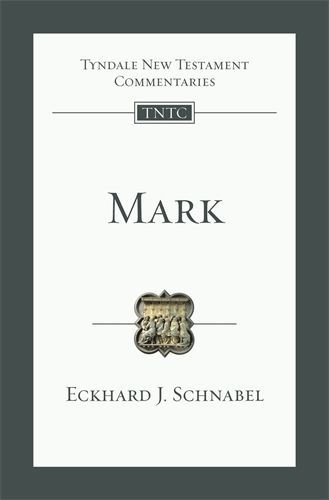
Tyndale New Testament Commentaries: Mark (Schnabel 2017) — TNTC
Mark wrote his Gospel to explain why and how Jesus is the Messiah and Son of God who fulfills God's promises as he proclaims and embodies the coming kingdom of God. Mark emphasizes Jesus' authority and also his suffering and death as God's will for his messianic mission.
Tyndale New Testament Commentaries: Mark from Eckhard Schnabel seeks to help today's Christian disciples communicate the significance of Jesus and the transforming power of the good news. An exegetical commentary on the Gospel of Mark, this volume will be useful for preachers, Bible teachers, and non-specialists alike.
Reviews
"The Tyndale volumes have long been the premier shorter-length commentary series on both Testaments throughout the English-speaking world." — Craig Blomberg, Denver Seminary"Tyndale commentaries are always useful, not least because they focus so clearly on the text of Scripture, and do not fall into the trap of paying too much attention to other commentaries and not enough to the scriptural text they are intended to expound and explain. So they retain their usefulness for preachers, Bible study leaders and for all readers of the Bible." — Peter Adam, principal, Ridley College, Melbourne, Australia
"Within its constraints, this series includes some outstanding volumes." — D. A. Carson, Trinity Evangelical Divinity School
"The evenness and quality of this series are remarkable." — Christianity Today
"There simply is no series of medium-length commentaries that approaches the excellence of the Tyndale commentaries." — Donald A. Hagner, Fuller Theological Seminary
Eckhard J. Schnabel (PhD, University of Aberdeen) is Mary F. Rockefeller Distinguished Professor of New Testament Studies at Gordon-Conwell Theological Seminary in South Hamilton, Massachusetts. He has taught previously at Trinity Evangelical Divinity School (Deerfield, Illinois), Freie Theologische Akademie (Giessen, Germany), Wiedenest Bible College (Bergneustadt, Germany), and Asian Theological Seminary (Manila, Philippines). His books include Early Christian Mission (volumes 1 & 2), Paul the Missionary, and Der erste Brief des Paulus an die Korinther. He is the author of numerous articles, including "Luke" (with David W. Pao) in Commentary on the New Testament Use of the Old Testament and contributions in Dictionary of Paul and His Letters and Dictionary of the Later New Testament & Its Developments.
Tyndale New Testament Commentaries: Mark, Rev. Ed. (Cole 1989) - TNTC

Tyndale New Testament Commentaries: Mark, Rev. Ed. (Cole 1989) - TNTC
The Tyndale New Testament Commentaries have long been a trusted resource for Bible study. Written by some of the world's most distinguished evangelical scholars, these twenty volumes offer clear, reliable, and relevant explanations of every book in the New Testament.
These Tyndale volumes are designed to help readers understand what the Bible actually says and what it means. The introduction to each volume gives a concise but thorough description of the authorship, date, and historical background of the biblical book under consideration. The commentary itself examines the text section by section, drawing out its main themes. It also comments on individual verses and deals with problems of interpretation. The aim throughout is to get at the true meaning of the Bible and to make its message plain to readers today.
Reviews
"The Tyndale volumes have long been the premier shorter-length commentary series on both Testaments throughout the English-speaking world." — Craig Blomberg, Denver Seminary"Tyndale commentaries are always useful, not least because they focus so clearly on the text of Scripture, and do not fall into the trap of paying too much attention to other commentaries and not enough to the scriptural text they are intended to expound and explain. So they retain their usefulness for preachers, Bible study leaders and for all readers of the Bible." — Peter Adam, principal, Ridley College, Melbourne, Australia
"Within its constraints, this series includes some outstanding volumes." — D. A. Carson, Trinity Evangelical Divinity School
"The evenness and quality of this series are remarkable." — Christianity Today
"There simply is no series of medium-length commentaries that approaches the excellence of the Tyndale commentaries." — Donald A. Hagner, Fuller Theological Seminary
The late R. Alan Cole was lecturer in Old Testament at Moore Theological College, Sydney, and Trinity Theological College, Singapore. He wrote the Tyndale New Testament Commentary series volumes Mark and Galatians.
Tyndale New Testament Commentaries: Matthew (France) - TNTC

Tyndale New Testament Commentaries: Matthew (France) - TNTC
The visit of the Magi, the Sermon on the Mount, the Great Commission: these are only a few of the well-known passages in Matthew's Gospel. Yet it begins with a list of unknown names and apparently irrelevant 'begettings'. The early church may have placed Matthew first in the New Testament because it provides a Christian perspective on the relation between the church and the Jews, an issue that is still important today. R. T. France tackles this and other key issues in the Gospel with clarity, reliability and relevance.
The Tyndale New Testament commentaries are designed to help the reader of the Bible understand what the text says and what it means. The Introduction to each book gives a concise but thorough treatment of its authorship, date, original setting and purpose. Following a structural Analysis, the Commentary takes the book section by section, drawing out its main themes, and also comments on individual verses and problems of interpretation. Additional Notes provide fuller discussion of particular difficulties. The goal throughout is to explain the true meaning of the Bible and make its message plain.
Reviews
"The Tyndale volumes have long been the premier shorter-length commentary series on both Testaments throughout the English-speaking world." — Craig Blomberg, Denver Seminary"Tyndale commentaries are always useful, not least because they focus so clearly on the text of Scripture, and do not fall into the trap of paying too much attention to other commentaries and not enough to the scriptural text they are intended to expound and explain. So they retain their usefulness for preachers, Bible study leaders and for all readers of the Bible." — Peter Adam, principal, Ridley College, Melbourne, Australia
"Within its constraints, this series includes some outstanding volumes." — D. A. Carson, Trinity Evangelical Divinity School
"The evenness and quality of this series are remarkable." — Christianity Today
"There simply is no series of medium-length commentaries that approaches the excellence of the Tyndale commentaries." — Donald A. Hagner, Fuller Theological Seminary
R. T. France has taught at London Bible College and was principal of Wycliffe Hall, Oxford, from 1989 to 1995. He has also been the rector of seven Anglican parishes. He is the author of Matthew in the Tyndale New Testament Commentary series, The Evidence for Jesus, Matthew: Evangelist and Teacher, two volumes of Mark in both the Doubleday Bible Commentary and the New International Greek Testament Commentary, and Women in the Church's Ministry: A Test Case for Biblical Hermeneutics.
Tyndale New Testament Commentaries: Philippians (Brown 2022) — TNTC

Tyndale New Testament Commentaries: Philippians (Brown 2022) — TNTC
The letter to the Philippians illuminates a warm relationship between the apostle Paul and the Philippian believers. Despite difficult situations being experienced on both sides, Paul finds ample reason to celebrate what God in Christ has done and is doing in the believers' lives.
Jeannine K. Brown's commentary on Philippians explores the themes of this epistle and how its message is still relevant to Christians in the twenty-first century. Brown shows how motifs of joy, contentment, and unity abound as Paul reminds the Philippians of the supreme value of knowing Jesus the Messiah, and she highlights their significance for shaping the contemporary church toward living more deeply in its identity in Christ.
This Tyndale New Testament commentary examines the text section-by-section—exploring the context in which it was written, providing thoughtful commentary on the letter to the Philippians, and then unpacking its theology. It will leave you with a thorough understanding of the content and structure of Paul's writing, as well as its meaning and continued relevance.
The Tyndale New Testament Commentaries are ideal resources for students and teachers of theology, as well as for preachers and individual Christians looking to delve deeper into the riches of Scripture. Insightful and comprehensive, Jeannine K. Brown's commentary on Philippians is a brilliant introduction that will give you a renewed appreciation for this rich Pauline epistle and a greater knowledge of why it is important to the Christian faith.
Jeannine K. Brown is Professor of New Testament at Bethel Seminary in San Diego, California, USA. Her books include Scripture as Communication, The Gospels as Stories and Biblical commentaries on the Gospel of Matthew. She is also the co-editor of the second edition of the Dictionary of Jesus and the Gospels.
Tyndale New Testament Commentaries: Philippians (Martin) - TNTC

Tyndale New Testament Commentaries: Philippians (Martin) - TNTC
Paul's letter to the Philippians may aptly be seen as a meditation on joy. But Paul's joy, rather than the result of ease and comfort, is a contentedness made pure through suffering. He has "learned the secret of being content in any and every situation, whether well fed or hungry, whether living in plenty or in want." Ralph Martin shows how these themes flow from and emulate Christ's humility, lead to spiritual fellowship among believers, and contribute to spreading the gospel.
The Tyndale New Testament Commentaries have long been a trusted resource for Bible study. Written by some of the world's most distinguished evangelical scholars, these twenty volumes offer clear, reliable, and relevant explanations of every book in the New Testament.
These Tyndale volumes are designed to help readers understand what the Bible actually says and what it means. The introduction to each volume gives a concise but thorough description of the authorship, date, and historical background of the biblical book under consideration. The commentary itself examines the text section by section, drawing out its main themes. It also comments on individual verses and deals with problems of interpretation. The aim throughout is to get at the true meaning of the Bible and to make its message plain to readers today.
Reviews
"The Tyndale volumes have long been the premier shorter-length commentary series on both Testaments throughout the English-speaking world." — Craig Blomberg, Denver Seminary"Tyndale commentaries are always useful, not least because they focus so clearly on the text of Scripture, and do not fall into the trap of paying too much attention to other commentaries and not enough to the scriptural text they are intended to expound and explain. So they retain their usefulness for preachers, Bible study leaders and for all readers of the Bible." — Peter Adam, principal, Ridley College, Melbourne, Australia
"Within its constraints, this series includes some outstanding volumes." — D. A. Carson, Trinity Evangelical Divinity School
"The evenness and quality of this series are remarkable." — Christianity Today
"There simply is no series of medium-length commentaries that approaches the excellence of the Tyndale commentaries." — Donald A. Hagner, Fuller Theological Seminary
Ralph P. Martin (1925-2013) was a distinguished New Testament scholar and a significant figure in the post-World War 2 resurgence of British evangelical scholarship. Born in Anfield, Liverpool, England, his early education was interrupted in 1939 by the war, and he was conscripted to work in the coal mines of Lancashire. After the war he pursued ministerial training at Manchester Baptist College and in 1949 earned his BA at the University of Manchester. In 1963 he completed his PhD at King’s College, University of London. In 1969 Martin joined the faculty of Fuller Theological Seminary in Pasadena, California, where he would serve as professor of New Testament from 1969 to 1988, and director of the graduate studies program beginning in 1979. He resumed his teaching there in 1995 as Distinguished Scholar in Residence. He was the author of numerous studies and commentaries on the New Testament, including Worship in the Early Church, the volume on Philippians in The Tyndale New Testament Commentary series, and 2 Corinthians and James in the Word Biblical Commentary, for which he also served as New Testament editor.
Tyndale New Testament Commentaries: Revelation (Morris 1987) - TNTC
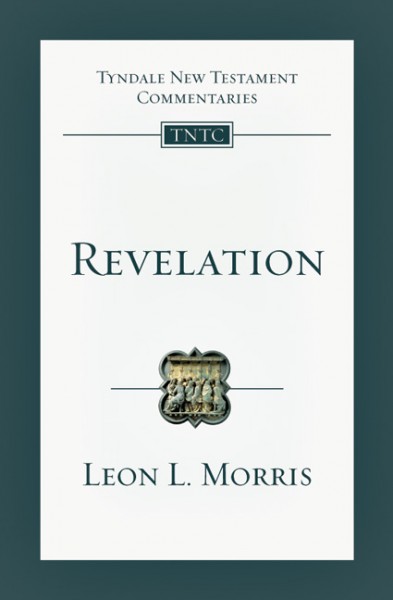
Tyndale New Testament Commentaries: Revelation (Morris 1987) - TNTC
"The book of Revelation is, I fear, a very neglected book. Its symbolism belongs to the first century, not to our own age," says Leon Morris in the preface to his commentary on Revelation.
Here he explains the significance of the symbolism and shows the bearing of the message of Revelation on the problems of the day in which it was written.
The Tyndale New Testament Commentaries have long been a trusted resource for Bible study. Written by some of the world's most distinguished evangelical scholars, these twenty volumes offer clear, reliable, and relevant explanations of every book in the New Testament.
These Tyndale volumes are designed to help readers understand what the Bible actually says and what it means. The introduction to each volume gives a concise but thorough description of the authorship, date, and historical background of the biblical book under consideration. The commentary itself examines the text section by section, drawing out its main themes. It also comments on individual verses and deals with problems of interpretation. The aim throughout is to get at the true meaning of the Bible and to make its message plain to readers today.
Reviews
"The Tyndale volumes have long been the premier shorter-length commentary series on both Testaments throughout the English-speaking world." — Craig Blomberg, Denver Seminary"Tyndale commentaries are always useful, not least because they focus so clearly on the text of Scripture, and do not fall into the trap of paying too much attention to other commentaries and not enough to the scriptural text they are intended to expound and explain. So they retain their usefulness for preachers, Bible study leaders and for all readers of the Bible." — Peter Adam, principal, Ridley College, Melbourne, Australia
"Within its constraints, this series includes some outstanding volumes." — D. A. Carson, Trinity Evangelical Divinity School
"The evenness and quality of this series are remarkable." — Christianity Today
"There simply is no series of medium-length commentaries that approaches the excellence of the Tyndale commentaries." — Donald A. Hagner, Fuller Theological Seminary
Leon Morris (1914-2006), one of the leading evangelical New Testament scholars of the twentieth century, served as principal of Ridley College in Melbourne, Australia. He was the author of more than forty works, including The Apostolic Preaching of the Cross, The Atonement, and comprehensive scholarly studies on Matthew, Luke, John, and Romans. He was the general editor of the Tyndale New Testament Commentaries and wrote the volumes in that series on Luke, 1 Corinthians, 1 & 2 Thessalonians, and Revelation.
Tyndale New Testament Commentaries: Revelation (Paul 2018) — TNTC
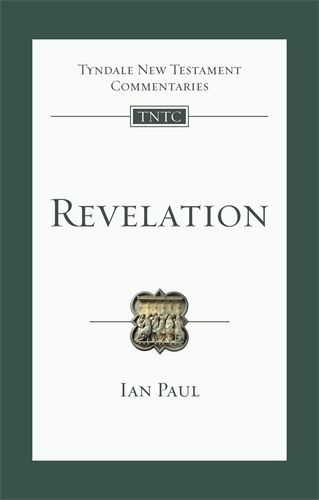
Tyndale New Testament Commentaries: Revelation (Paul 2018) — TNTC
The Book of Revelation is a remarkable text. A fascinating piece of Scripture as well as an extraordinary piece of literature, its interpretation has affected our theology, art and worship, and even international politics. Yet it is widely neglected in the church and almost entirely avoided from the pulpit. In Tyndale New Testament Commentaries: Revelation, Ian Paul takes a disciplined approach to the text, paying careful attention to the ways that John draws from the Old Testament. Additionally, Paul examines how the original audience would have heard this message from John, and then draws helpful comments for contemporary reflection.
The Tyndale New Testament Commentaries are designed to help the reader of the Bible understand what the text says and what it means. The introduction to each book gives a concise but thorough treatment of its authorship, date, original setting, and purpose. Following a structural analysis, the commentary takes the book section by section, drawing out its main themes, and also comments on individual verses and problems of interpretation. Additional notes provide fuller discussion of particular difficulties.
Reviews
"The Tyndale volumes have long been the premier shorter-length commentary series on both Testaments throughout the English-speaking world." — Craig Blomberg, Denver Seminary"Tyndale commentaries are always useful, not least because they focus so clearly on the text of Scripture, and do not fall into the trap of paying too much attention to other commentaries and not enough to the scriptural text they are intended to expound and explain. So they retain their usefulness for preachers, Bible study leaders and for all readers of the Bible." — Peter Adam, principal, Ridley College, Melbourne, Australia
"Within its constraints, this series includes some outstanding volumes." — D. A. Carson, Trinity Evangelical Divinity School
"The evenness and quality of this series are remarkable." — Christianity Today
"There simply is no series of medium-length commentaries that approaches the excellence of the Tyndale commentaries." — Donald A. Hagner, Fuller Theological Seminary
Ian Paul is a freelance theologian, writer, speaker, adjunct professor of New Testament at Fuller Theological Seminary, and associate minister at St Nicholas' Church, Nottingham, England.
Tyndale New Testament Commentaries: Romans (Bruce) - TNTC
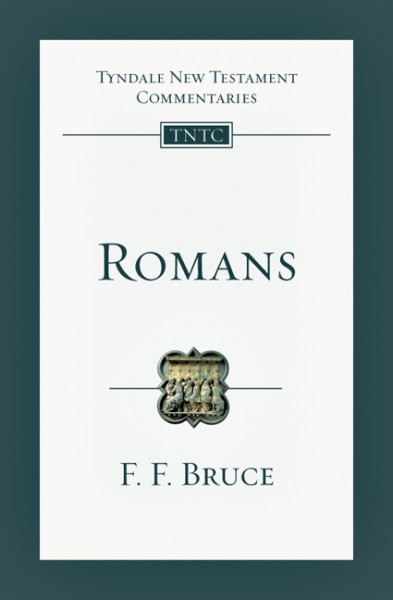
Tyndale New Testament Commentaries: Romans (Bruce) - TNTC
Paul's epistle to the Romans changed the lives of many great Christian thinkers, including Augustine, Martin Luther, John Wesley and Karl Barth. However, while Romans has been among the most influential books of the New Testament, it has also been the subject of some of the church's most heated debates. What is justification by faith? What is the relationship between law and grace? What is God's ultimate purpose for Israel? Without losing sight of the simplicity of the gospel, F. F. Bruce guides us along the difficult but rewarding paths of this great letter.
The Tyndale New Testament Commentaries have long been a trusted resource for Bible study. Written by some of the world's most distinguished evangelical scholars, these twenty volumes offer clear, reliable and relevant explanations of every book in the New Testament.
These Tyndale volumes are designed to help readers understand what the Bible actually says and what it means. The introduction to each volume gives a concise but thorough description of the authorship, date and historical background of the biblical book under consideration. The commentary itself examines the text section by section, drawing out its main themes. It also comments on individual verses and deals with problems of interpretation. The aim throughout is to get at the true meaning of the Bible and to make its message plain to readers today.
Reviews
"The Tyndale volumes have long been the premier shorter-length commentary series on both Testaments throughout the English-speaking world." — Craig Blomberg, Denver Seminary"Tyndale commentaries are always useful, not least because they focus so clearly on the text of Scripture, and do not fall into the trap of paying too much attention to other commentaries and not enough to the scriptural text they are intended to expound and explain. So they retain their usefulness for preachers, Bible study leaders and for all readers of the Bible." — Peter Adam, principal, Ridley College, Melbourne, Australia
"Within its constraints, this series includes some outstanding volumes." — D. A. Carson, Trinity Evangelical Divinity School
"The evenness and quality of this series are remarkable." — Christianity Today
"There simply is no series of medium-length commentaries that approaches the excellence of the Tyndale commentaries." — Donald A. Hagner, Fuller Theological Seminary
F. F. Bruce (1910–1990) was Rylands Professor of Biblical Criticism and Exegesis at the University of Manchester in England. During his distinguished career, he wrote more than forty bestselling commentaries and books, including A Mind for What Matters and Paul, Apostle of the Heart Set Free. He also served as general editor of The New International Commentary on the New Testament.
Tyndale New Testament Commentaries: Romans (Garland 2021) - TNTC

Tyndale New Testament Commentaries: Romans (Garland 2021) - TNTC
Romans has been described as the theological epistle par excellence. The apostle Paul emphasizes that salvation is by God’s grace alone, and gives the assurance that freedom, hope, and the gift of righteousness are secured through Christ’s death on the cross, with the promise of a new and glorious destiny. Through the power of the Holy Spirit, believers can discern and do the will of God in everyday life. God’s purpose is to bring Jews and Gentiles together so that they may glorify the God and Father of our Lord Jesus Christ with one voice. David Garland offers clear guidance along the rewarding, though sometimes difficult, paths of this great letter.
The Tyndale Old Testament Commentaries have long been a trusted resource for Bible study. The introduction to each volume gives a concise but thorough description of the authorship, date and historical background of the biblical book under consideration. The commentary itself examines the text section by section, drawing out its main themes. It also comments on individual verses and deals with problems of interpretation. Written by some of the world's most distinguished evangelical scholars, they continue to aim at the true meaning of the Bible and to make its message plain to readers today.
David Garland is Professor of Christian Scriptures at George W. Truett Theological Seminary, Baylor University, USA. His books include The Intention of Matthew 23 and Reading Matthew: A Literary and Theological Commentary on the First Gospel. He has also written several commentary volumes, including the Mark and Colossians/Philemon volumes in the NIV Application Commentary, the 2 Corinthians volume in the New American Commentary, the Mark volume in the Zondervan Illustrated Bible Backgrounds Commentary, the 1 Corinthians volume in the Baker Exegetical Commentary on the New Testament, and the Luke volume in the Zondervan Exegetical Commentary on the New Testament. He has published more than fifty articles, and his books have been translated into Spanish, Korean, Russian and Portuguese.
Tyndale New Testament Commentaries: The Letters of John (Stott) - TNTC

Tyndale New Testament Commentaries: The Letters of John (Stott) - TNTC
"John evidently loves the people committed to his care," says John Stott in the preface to this commentary on 1, 2 and 3 John. "They are his 'dear children,' his 'dear friends.' He longs to protect them from both error and evil and to see them firmly established in faith, love and holiness. He has no new doctrine for them. On the contrary, he appeals to them to remember what they already know, have and are. He warns them against deviating from this and urges them to remain loyal to it. Whenever innovators trouble the church, and ridicule whatever is old or traditional, we need to hear and heed John's exhortation, to continue in what we have learned and received, and to let it continue in us."
The Tyndale New Testament Commentaries have long been a trusted resource for Bible study. Written by some of the world's most distinguished evangelical scholars, these twenty volumes offer clear, reliable, and relevant explanations of every book in the New Testament.
These Tyndale volumes are designed to help readers understand what the Bible actually says and what it means. The introduction to each volume gives a concise but thorough description of the authorship, date, and historical background of the biblical book under consideration. The commentary itself examines the text section by section, drawing out its main themes. It also comments on individual verses and deals with problems of interpretation. The aim throughout is to get at the true meaning of the Bible and to make its message plain to readers today.
Reviews
"The Tyndale volumes have long been the premier shorter-length commentary series on both Testaments throughout the English-speaking world." — Craig Blomberg, Denver Seminary"Tyndale commentaries are always useful, not least because they focus so clearly on the text of Scripture, and do not fall into the trap of paying too much attention to other commentaries and not enough to the scriptural text they are intended to expound and explain. So they retain their usefulness for preachers, Bible study leaders and for all readers of the Bible." — Peter Adam, principal, Ridley College, Melbourne, Australia
"Within its constraints, this series includes some outstanding volumes." — D. A. Carson, Trinity Evangelical Divinity School
"The evenness and quality of this series are remarkable." — Christianity Today
"There simply is no series of medium-length commentaries that approaches the excellence of the Tyndale commentaries." — Donald A. Hagner, Fuller Theological Seminary
John R. W. Stott (1921–2011) served as rector of All Souls Church in London, where he carried out an effective urban pastoral ministry. A leader among evangelicals in Britain and the United States and around the world, Stott was a principal framer of the landmark Lausanne Covenant (1974). Stott's best-known work, Basic Christianity, has sold two million copies and has been translated into more than sixty languages. Other titles include The Cross of Christ, Understanding the Bible, The Contemporary Christian, Evangelical Truth, Issues Facing Christians Today, The Incomparable Christ, Why I Am a Christian, and Through the Bible Through the Year, a daily devotional. He has also written eight volumes in The Bible Speaks Today series of New Testament expositions.
Stott was honored by Time magazine in 2005 as one of the "100 Most Influential People in the World" and was named in the Queen’s New Years Honours list as Commander of the Order of the British Empire.
Tyndale New Testament Commentaries: The Pastoral Epistles (Guthrie) - TNTC
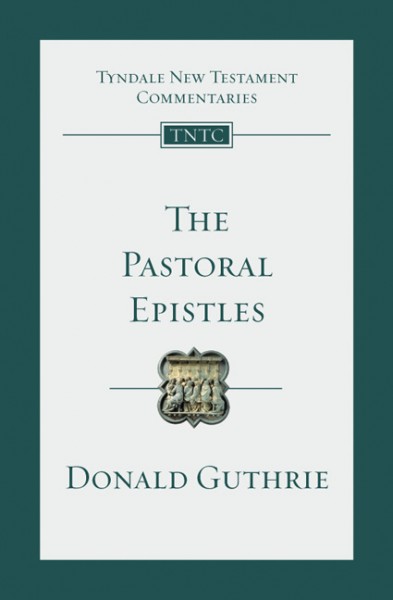
Tyndale New Testament Commentaries: The Pastoral Epistles (Guthrie) - TNTC
The Tyndale New Testament Commentaries have long been a trusted resource for Bible study. Written by some of the world's most distinguished evangelical scholars, these twenty volumes offer clear, reliable, and relevant explanations of every book in the New Testament.
These Tyndale volumes are designed to help readers understand what the Bible actually says and what it means. The introduction to each volume gives a concise but thorough description of the authorship, date, and historical background of the biblical book under consideration. The commentary itself examines the text section by section, drawing out its main themes. It also comments on individual verses and deals with problems of interpretation. The aim throughout is to get at the true meaning of the Bible and to make its message plain to readers today.
Reviews
"The Tyndale volumes have long been the premier shorter-length commentary series on both Testaments throughout the English-speaking world." — Craig Blomberg, Denver Seminary"Tyndale commentaries are always useful, not least because they focus so clearly on the text of Scripture, and do not fall into the trap of paying too much attention to other commentaries and not enough to the scriptural text they are intended to expound and explain. So they retain their usefulness for preachers, Bible study leaders and for all readers of the Bible." — Peter Adam, principal, Ridley College, Melbourne, Australia
"Within its constraints, this series includes some outstanding volumes." — D. A. Carson, Trinity Evangelical Divinity School
"The evenness and quality of this series are remarkable." — Christianity Today
"There simply is no series of medium-length commentaries that approaches the excellence of the Tyndale commentaries." — Donald A. Hagner, Fuller Theological Seminary
Donald Guthrie (1915-1992) was a graduate of the University of London (B.D., Th.M., Ph.D.). From 1949 until his retirement in 1982 Guthrie was lecturer in New Testament studies at London Bible College, and from 1978 until 1982 he also served as vice principal of the college. His books include New Testament Introduction, New Testament Theology, and the Tyndale New Testament Commentaries on the Pastoral Epistles and Hebrews.
Tyndale New Testament Commentaries: The Pastoral Epistles (Padilla 2022) - TNTC

Tyndale New Testament Commentaries: The Pastoral Epistles (Padilla 2022) - TNTC
In his New Testament letters to Timothy and Titus, the apostle Paul is concerned with church order, defending correct doctrine, and passing on the faith.
In this introduction and commentary to both letters, Osvaldo Padilla sets them in their distinct context of Paul's later ministry and draws out their pastoral wisdom. With thoughtful exposition he shows how the lessons Paul imparts to Timothy and Titus are still relevant to us today and how we can learn from them in our own walk with Christ.
This Tyndale New Testament Commentary volume examines the text section-by-section—exploring the historical background in which the letters to Timothy and Titus were written, providing a detailed commentary on their content, and then unpacking their theology. The Pastoral Epistles will leave you with a thorough knowledge of what the pastoral epistles say and how they are structured, as well as a better understanding of their meaning for both the original recipients and modern Christians. Clear and compelling, Padilla's introduction to Timothy and Titus will give anyone looking for comprehensive but accessible commentaries on the pastoral epistles a renewed appreciation for the wisdom in these two letters and what they can teach us.
The Tyndale New Testament Commentaries are ideal for students and teachers of theology and an excellent resource for preachers and individual Christians looking to broaden their knowledge and explore the riches of Scripture more deeply.
Osvaldo Padilla (PhD, University of Aberdeen) is professor of divinity at Beeson Divinity School in Birmingham, Alabama. He is the author of The Acts of the Apostles, The Speeches of Outsiders in Acts, and he has written articles and reviews for Themelios, Bulletin for Biblical Research, New Testament Studies, and Ex Auditu. Previously, he taught New Testament at Trinity Evangelical Divinity School and served as pastor of Jesus el Buen Pastor, a Hispanic congregation in the Chicago area. He is married to Kristen, and they have one son.
Tyndale Old Testament Commentaries: 1 & 2 Samuel (Long 2020) - TOTC

Tyndale Old Testament Commentaries: 1 & 2 Samuel (Long 2020) - TOTC
The stories of Samuel, Saul and David are among the most memorable in the Old Testament. Yet the lives of these individuals are bound up in the larger story of God's purpose for his people. V. Philips Long explores the meaning of the biblical history of Israel's vital transition from a confederation of tribes to nationhood under a king. He shows how attending to the books of Samuel repays their readers richly in terms of literary appreciation, historical knowledge and theological grounding.
The Tyndale Old Testament Commentaries have long been a trusted resource for Bible study. The introduction to each volume gives a concise but thorough description of the authorship, date and historical background of the biblical book under consideration. The commentary itself examines the text section by section, drawing out its main themes. It also comments on individual verses and deals with problems of interpretation. Written by some of the world's most distinguished evangelical scholars, they continue to aim at the true meaning of the Bible and to make its message plain to readers today.
V. Phillips Long is Professor Emeritus of Old Testament at Regent College, Vancouver, and an ordained teaching elder in the PCA. His books include The Reign and Rejection of King Saul: A Case for Literary and Theological Coherence, The Art of Biblical History, the co-authored work A Biblical History of Israel, and the 1 and 2 Samuel volume in the Zondervan Illustrated Bible Background Commentary. He is the author of a number of scholarly and more popular articles, commentary notes and reviews, and has served on a variety of translation projects (NLT, ESV, Message).
Tyndale Old Testament Commentaries: 1 and 2 Kings (Wiseman) - TOTC

Tyndale Old Testament Commentaries: 1 and 2 Kings (Wiseman) - TOTC
The book of Kings is a unique source for understanding the history of Israel from the last days of the united kingdom under David to the eventual fall of the kingdoms of Israel and Judah. Presenting Israel's national history from a divine viewpoint, these narratives measure the kings of Israel and Judah not by the mark they leave on secular history, but by their "doing what is right in the Lord's sight." Embedded in this story are enduring lessons of the ways of God with his people in every age.
In this commentary Donald Wiseman brings to this portion of Scripture his lifelong study of the archaeology, history, languages and documents of the ancient Near East. No other commentary on Kings offers as much historical background and well-considered judgment in such concise and accessible form.
The Tyndale Old Testament Commentaries have long been a trusted resource for Bible study. The introduction to each volume gives a concise but thorough description of the authorship, date and historical background of the biblical book under consideration. The commentary itself examines the text section by section, drawing out its main themes. It also comments on individual verses and deals with problems of interpretation. Written by some of the world's most distinguished evangelical scholars, these volumes retain their original text now retypeset in a larger format. As always, they continue to aim at the true meaning of the Bible and to make its message plain to readers today.
Reviews
"The Tyndale volumes have long been the premier shorter-length commentary series on both Testaments throughout the English-speaking world." — Craig Blomberg, Denver Seminary"Tyndale commentaries are always useful, not least because they focus so clearly on the text of Scripture, and do not fall into the trap of paying too much attention to other commentaries and not enough to the scriptural text they are intended to expound and explain. So they retain their usefulness for preachers, Bible study leaders and for all readers of the Bible." — Peter Adam, principal, Ridley College, Melbourne, Australia
"Within its constraints, this series includes some outstanding volumes." — D. A. Carson, Trinity Evangelical Divinity School
"The evenness and quality of this series are remarkable." — Christianity Today
"There simply is no series of medium-length commentaries that approaches the excellence of the Tyndale commentaries." — Donald A. Hagner, Fuller Theological Seminary
Donald J. Wiseman (1918–2010) was emeritus professor of Assyriology at the University of London in England.
Tyndale Old Testament Commentaries: 1 and 2 Samuel (Baldwin) - TOTC

Tyndale Old Testament Commentaries: 1 and 2 Samuel (Baldwin) - TOTC
Recipient of a 1990 Christianity Today Critics' Choice Award!
The stories of Samuel, Saul and David are among the most memorable in the Old Testament. Yet the lives of these individuals are wound up in the larger story of God's purpose for his people. Looking beyond the well-known surface of these stories Joyce Baldwin explores the meaning of the biblical history of Israel's vital transition from a confederation of tribes to nationhood under a king.
Bible students at all levels will find that this commentary provides an excellent introduction to the critical issues of authorship, date, composition and structure of Samuel, as well as an able discussion of its theological themes. Written in a clear and straightforward style, here is a worthy addition to the acclaimed Tyndale Commentary series.
The Tyndale Old Testament Commentaries have long been a trusted resource for Bible study. The introduction to each volume gives a concise but thorough description of the authorship, date and historical background of the biblical book under consideration. The commentary itself examines the text section by section, drawing out its main themes. It also comments on individual verses and deals with problems of interpretation. Written by some of the world's most distinguished evangelical scholars, these volumes retain their original text now retypeset in a larger format. As always, they continue to aim at the true meaning of the Bible and to make its message plain to readers today.
Reviews
"The Tyndale volumes have long been the premier shorter-length commentary series on both Testaments throughout the English-speaking world." — Craig Blomberg, Denver Seminary"Tyndale commentaries are always useful, not least because they focus so clearly on the text of Scripture, and do not fall into the trap of paying too much attention to other commentaries and not enough to the scriptural text they are intended to expound and explain. So they retain their usefulness for preachers, Bible study leaders and for all readers of the Bible." — Peter Adam, principal, Ridley College, Melbourne, Australia
"Within its constraints, this series includes some outstanding volumes." — D. A. Carson, Trinity Evangelical Divinity School
"The evenness and quality of this series are remarkable." — Christianity Today
"There simply is no series of medium-length commentaries that approaches the excellence of the Tyndale commentaries." — Donald A. Hagner, Fuller Theological Seminary
Joyce G. Baldwin (B.A., B.D.) was principal of Trinity College, Bristol, and wrote several volumes in the Tyndale Old Testament Commentary series. She passed away in 1996.
Tyndale Old Testament Commentaries: 1 Chronicles (Selman) - TOTC
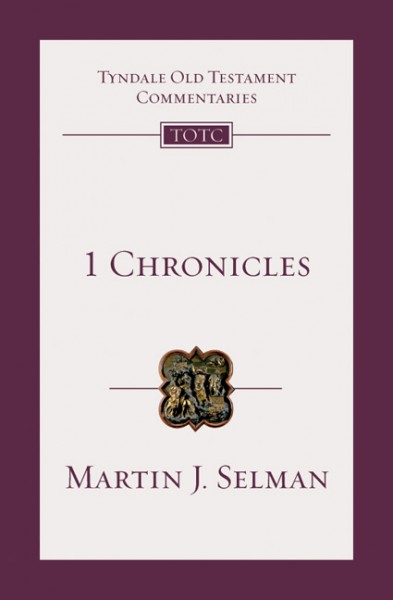
Tyndale Old Testament Commentaries: 1 Chronicles (Selman) - TOTC
The Chronicler wrote as a pastoral theologian. The congregation he addressed was an Israel separated from its former days of blessing by a season of judgment. The books of 1 and 2 Chronicles bring a divine word of healing and reaffirm the hope of restoration to a nation that needed to regain its footing in God's promises and to reshape its life before God.
The Chronicler expounds the Bible as he knows it, skillfully weaving his commentary into the linear text of Israel's history. His theme is straightforward--the promises of God revealed in the Davidic covenant are as trustworthy and as effective as the God who first uttered them.
In two volumes Martin Selman provides an excellent interpretation of these sorely neglected yet profound books of the Old Testament. The first volume on 1 Chronicles provides a full introduction that surveys the Chronicler's method, summarizes major theological themes and serves as a valuable entrée into the heart of the work we now know as 1 & 2 Chronicles.
The Tyndale Old Testament Commentaries have long been a trusted resource for Bible study. The introduction to each volume gives a concise but thorough description of the authorship, date and historical background of the biblical book under consideration. The commentary itself examines the text section by section, drawing out its main themes. It also comments on individual verses and deals with problems of interpretation. Written by some of the world's most distinguished evangelical scholars, these volumes retain their original text now retypeset in a larger format. As always, they continue to aim at the true meaning of the Bible and to make its message plain to readers today.
Reviews
"The Tyndale volumes have long been the premier shorter-length commentary series on both Testaments throughout the English-speaking world." — Craig Blomberg, Denver Seminary"Tyndale commentaries are always useful, not least because they focus so clearly on the text of Scripture, and do not fall into the trap of paying too much attention to other commentaries and not enough to the scriptural text they are intended to expound and explain. So they retain their usefulness for preachers, Bible study leaders and for all readers of the Bible." — Peter Adam, principal, Ridley College, Melbourne, Australia
"Within its constraints, this series includes some outstanding volumes." — D. A. Carson, Trinity Evangelical Divinity School
"The evenness and quality of this series are remarkable." — Christianity Today
"There simply is no series of medium-length commentaries that approaches the excellence of the Tyndale commentaries." — Donald A. Hagner, Fuller Theological Seminary
Martin J. Selman (B.A., M.A., Ph.D.) is lecturer in Old Testament, director of postgraduate studies and deputy principal at Spurgeon's College, London.
Tyndale Old Testament Commentaries: 2 Chronicles (Selman) - TOTC
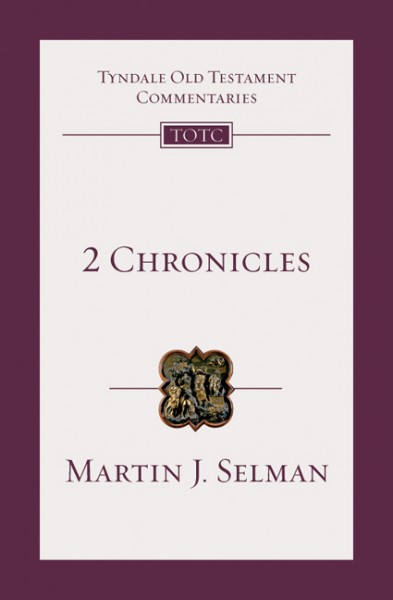
Tyndale Old Testament Commentaries: 2 Chronicles (Selman) - TOTC
The Chronicler wrote as a pastoral theologian. The congregation he addressed was an Israel separated from its former days of blessing by a season of judgment. The books of 1 and 2 Chronicles bring a divine word of healing and reaffirm the hope of restoration to a nation that needed to regain its footing in God's promises and to reshape its life before God.
The Chronicler expounds the Bible as he knows it, skillfully weaving his commentary into the linear text of Israel's history. His theme is straightforward--the promises of God revealed in the Davidic covenant are as trustworthy and as effective as the God who first uttered them.
In two volumes Martin Selman provides an excellent interpretation of these sorely neglected yet profound books of the Old Testament. This volume on 2 Chronicles continues to build on the groundwork laid by its companion in 1 Chronicles.
The Tyndale Old Testament Commentaries have long been a trusted resource for Bible study. The introduction to each volume gives a concise but thorough description of the authorship, date and historical background of the biblical book under consideration. The commentary itself examines the text section by section, drawing out its main themes. It also comments on individual verses and deals with problems of interpretation. Written by some of the world's most distinguished evangelical scholars, these volumes retain their original text now retypeset in a larger format. As always, they continue to aim at the true meaning of the Bible and to make its message plain to readers today.
Reviews
"The Tyndale volumes have long been the premier shorter-length commentary series on both Testaments throughout the English-speaking world." — Craig Blomberg, Denver Seminary"Tyndale commentaries are always useful, not least because they focus so clearly on the text of Scripture, and do not fall into the trap of paying too much attention to other commentaries and not enough to the scriptural text they are intended to expound and explain. So they retain their usefulness for preachers, Bible study leaders and for all readers of the Bible." — Peter Adam, principal, Ridley College, Melbourne, Australia
"Within its constraints, this series includes some outstanding volumes." — D. A. Carson, Trinity Evangelical Divinity School
"The evenness and quality of this series are remarkable." — Christianity Today
"There simply is no series of medium-length commentaries that approaches the excellence of the Tyndale commentaries." — Donald A. Hagner, Fuller Theological Seminary
Martin J. Selman (B.A., M.A., Ph.D.) is lecturer in Old Testament, director of postgraduate studies and deputy principal at Spurgeon's College, London.
Tyndale Old Testament Commentaries: Daniel (Baldwin 1978) - TOTC

Tyndale Old Testament Commentaries: Daniel (Baldwin 1978) - TOTC
Daniel is a difficult book. But it is a book about the meaning of history, and people today need its message. The whole church needs reassurance, especially in view of Marxist claims to be able by human effort to introduce a utopian world government. "When the church lets part of its message go by default people look elsewhere for a substitute," writes Joyce Baldwin. "All the more reason, then, why the church needs to be counting on the certainties proclaimed by Daniel, namely that God is constantly overruling and judging in the affairs of men, putting down the mighty from their seats, overthrowing unjust regimes and effectively bringing in His kingdom, which is to embrace all nations."
The Tyndale Old Testament Commentaries have long been a trusted resource for Bible study. The introduction to each volume gives a concise but thorough description of the authorship, date and historical background of the biblical book under consideration. The commentary itself examines the text section by section, drawing out its main themes. It also comments on individual verses and deals with problems of interpretation. Written by some of the world's most distinguished evangelical scholars, these volumes retain their original text now retypeset in a larger format. As always, they continue to aim at the true meaning of the Bible and to make its message plain to readers today.
Reviews
"The Tyndale volumes have long been the premier shorter-length commentary series on both Testaments throughout the English-speaking world." — Craig Blomberg, Denver Seminary"Tyndale commentaries are always useful, not least because they focus so clearly on the text of Scripture, and do not fall into the trap of paying too much attention to other commentaries and not enough to the scriptural text they are intended to expound and explain. So they retain their usefulness for preachers, Bible study leaders and for all readers of the Bible." — Peter Adam, principal, Ridley College, Melbourne, Australia
"Within its constraints, this series includes some outstanding volumes." — D. A. Carson, Trinity Evangelical Divinity School
"The evenness and quality of this series are remarkable." — Christianity Today
"There simply is no series of medium-length commentaries that approaches the excellence of the Tyndale commentaries." — Donald A. Hagner, Fuller Theological Seminary
Joyce G. Baldwin (B.A., B.D.) was principal of Trinity College, Bristol, and wrote several volumes in the Tyndale Old Testament Commentary series. She passed away in 1996.
Tyndale Old Testament Commentaries: Daniel (House 2018) — TOTC
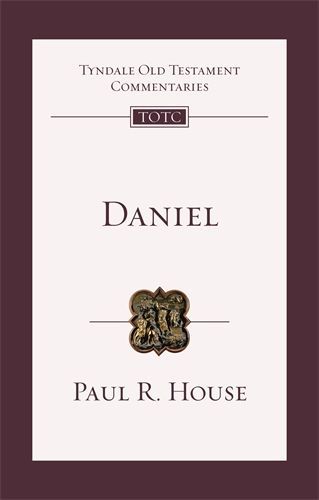
Tyndale Old Testament Commentaries: Daniel (House 2018) — TOTC
Daniel asserts that the meaning of history is that God's kingdom is coming. As it does, faithful people persevere in their work for God. Believers can rely on the certainties the book proclaims: God is sovereign over human affairs and is effectively bringing in his eternal kingdom, which will encompass all nations. In Tyndale Old Testament Commentaries: Daniel, Paul House shows how Daniel rewards readers who embrace its historical, literary, and theological features as key means of personal and community formation.
The Tyndale Commentaries are designed to help the reader of the Bible understand what the text says and what it means. The introduction to each book gives a concise but thorough treatment of its authorship, date, original setting, and purpose. Following a structural analysis, the commentary takes the book section by section, drawing out its main themes, and also comments on individual verses and problems of interpretation. Additional notes provide fuller discussion of particular difficulties.
In the new Old Testament volumes, the commentary on each section of the text is structured under three headings: Context, Comment, and Meaning. The goal is to explain the true meaning of the Bible and make its message plain.
Reviews
"The Tyndale volumes have long been the premier shorter-length commentary series on both Testaments throughout the English-speaking world." — Craig Blomberg, Denver Seminary"Tyndale commentaries are always useful, not least because they focus so clearly on the text of Scripture, and do not fall into the trap of paying too much attention to other commentaries and not enough to the scriptural text they are intended to expound and explain. So they retain their usefulness for preachers, Bible study leaders and for all readers of the Bible." — Peter Adam, principal, Ridley College, Melbourne, Australia
"Within its constraints, this series includes some outstanding volumes." — D. A. Carson, Trinity Evangelical Divinity School
"The evenness and quality of this series are remarkable." — Christianity Today
"There simply is no series of medium-length commentaries that approaches the excellence of the Tyndale commentaries." — Donald A. Hagner, Fuller Theological Seminary
Paul R. House teaches at Beeson Divinity School of Samford University (Birmingham, Alabama). An Old Testament scholar, he has taught previously at Taylor University, Southern Baptist Theological Seminary, and Wheaton College.
Tyndale Old Testament Commentaries: Deuteronomy (Woods) - TOTC
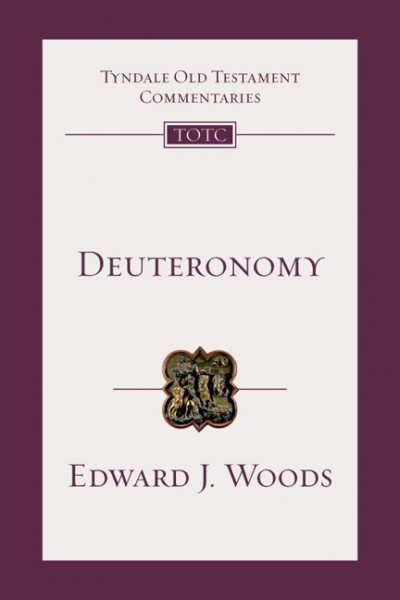
Tyndale Old Testament Commentaries: Deuteronomy (Woods) - TOTC
A dramatic address delivered on the verge of Israel’s entry into the land of Canaan, Deuteronomy has been described as a book "on the boundary." Ted Woods expounds its all-encompassing vision and shows how the Israelites were exhorted to make its words the interpreter of their life's story within the land "beyond the Jordan."
This completely new volume replaces the previous editon of Deuteronomy in the Tyndale Commentary series written by J. A. Thompson.
The Tyndale Old Testament Commentaries have long been a trusted resource for Bible study. The introduction to each volume gives a concise but thorough description of the authorship, date and historical background of the biblical book under consideration. The commentary itself examines the text section by section, drawing out its main themes. It also comments on individual verses and deals with problems of interpretation. Written by some of the world's most distinguished evangelical scholars, these volumes retain their original text now retypeset in a larger format. As always, they continue to aim at the true meaning of the Bible and to make its message plain to readers today.
Reviews
"Tyndale commentaries are always useful, not least because they focus so clearly on the text of Scripture, and do not fall into the trap of paying too much attention to other commentaries and not enough to the scriptural text they are intended to expound and explain. So they retain their usefulness for preachers, Bible study leaders and for all readers of the Bible." — Peter Adam, principal, Ridley College, Melbourne, Australia
"Within its constraints, this series includes some outstanding volumes." — D. A. Carson, Trinity Evangelical Divinity School
"The evenness and quality of this series are remarkable." — Christianity Today
"There simply is no series of medium-length commentaries that approaches the excellence of the Tyndale commentaries." — Donald A. Hagner, Fuller Theological Seminary
Now retired, Edward J. Woods was formerly Senior Lecturer in Old Testament at the Melbourne School of Theology, Victoria, Australia (formerly the Bible College of Victoria), where he still teaches part time. He has also served as a moderator in Old Testament studies for the Australian College of Theology, as a pastor in Australia and as a theological teacher in Northern Zambia.
Tyndale Old Testament Commentaries: Ecclesiastes (Eaton 1983) - TOTC

Tyndale Old Testament Commentaries: Ecclesiastes (Eaton 1983) - TOTC
"If it needs a man who has suffered to write a commentary on Job . . . . Perhaps the only person entitled to comment on Ecclesiastes is a cynic who has revolted from the world in disillusionment and disgust." "If so," writes Michael Eaton, "I qualify."
Scholars have long wrestled with the gloomy pessimism and striking omission of any mention of Yahweh in this portion of the Wisdom literature. After setting forth the issues related to the text, authorship, date and canonicity, Eaton assesses the purpose and structure of the book. He then provides a passage-by-passage analysis that attempts to account for the oddities of the text and to show its contemporary relevance.
The Tyndale Old Testament Commentaries have long been a trusted resource for Bible study. The introduction to each volume gives a concise but thorough description of the authorship, date and historical background of the biblical book under consideration. The commentary itself examines the text section by section, drawing out its main themes. It also comments on individual verses and deals with problems of interpretation. Written by some of the world's most distinguished evangelical scholars, these volumes retain their original text now retypeset in a larger format. As always, they continue to aim at the true meaning of the Bible and to make its message plain to readers today.
Reviews
"The Tyndale volumes have long been the premier shorter-length commentary series on both Testaments throughout the English-speaking world." — Craig Blomberg, Denver Seminary"Tyndale commentaries are always useful, not least because they focus so clearly on the text of Scripture, and do not fall into the trap of paying too much attention to other commentaries and not enough to the scriptural text they are intended to expound and explain. So they retain their usefulness for preachers, Bible study leaders and for all readers of the Bible." — Peter Adam, principal, Ridley College, Melbourne, Australia
"Within its constraints, this series includes some outstanding volumes." — D. A. Carson, Trinity Evangelical Divinity School
"The evenness and quality of this series are remarkable." — Christianity Today
"There simply is no series of medium-length commentaries that approaches the excellence of the Tyndale commentaries." — Donald A. Hagner, Fuller Theological Seminary
Michael Eaton has served as lecturer in Old Testament at Baptist Theological College of Southern Africa and is pastor-at-large of Chrisco Fellowship of Churches in Nairobi, Kenya.
Tyndale Old Testament Commentaries: Ecclesiastes (Heim 2019) — TOTC
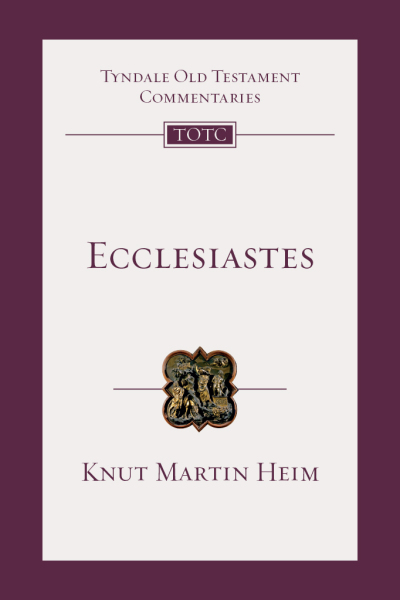
Tyndale Old Testament Commentaries: Ecclesiastes (Heim 2019) — TOTC
The book of Ecclesiastes is probably best known for its repeated refrain that "everything is meaningless," or "vanity." However, a thorough reading demonstrates that this is not its final conclusion.
Knut Heim's Tyndale commentary shows that the book is intellectually sophisticated, theologically rich, emotionally deep—and full of humor. While it is realistic about life, it is life-affirming and immensely practical. It is also politically engaged, presenting its critique of a repressive foreign regime in an entertaining and thought-provoking way.
The Tyndale Commentaries are designed to help the reader of the Bible understand what the text says and what it means. The Introduction to each book gives a concise but thorough treatment of its authorship, date, original setting, and purpose. Following a structural Analysis, the Commentary takes the book section by section, drawing out its main themes, and also comments on individual verses and problems of interpretation. Additional Notes provide fuller discussion of particular difficulties.
In the new Old Testament volumes, the commentary on each section of the text is structured under three headings: Context, Comment, and Meaning. The goal is to explain the true meaning of the Bible and make its message plain.
Knut Martin Heim, PhD is Professor in Old Testament at Denver Seminary Littleton. He is a Presbyter in the Methodist Church of the United Kingdom. He is a member of The Society of Biblical Literature, The Institute of Biblical Research, The Society for the Study of the Old Testament (UK), and The Tyndale Fellowship (UK). His PhD was completed at the University of Liverpool, and his books include Like Grapes of Gold Set in Silver: An Interpretation of Proverbial Clusters in the Book of Proverbs and Poetic Imagination in Proverbs: Variant Repetitions and the Nature of Poetry.






- Adapt your commentary collection month-to-month based on the book or books you are studying.
- Build your commentary library strategically without hundreds of dollars of upfront investment.
- Never get stuck with commentaries you rarely use - swap them out each month as your needs change.



